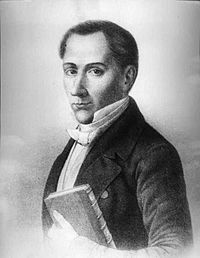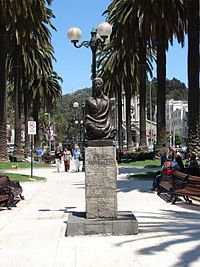- Diego Portales
-
Diego Portales 
Born June 16, 1793
Santiago, ChileDied June 6, 1837 (aged 43)
Valparaíso, ChileDiego José Pedro Víctor Portales Palazuelos (June 16, 1793 - June 6, 1837) was a Chilean statesman and entrepreneur. As a minister of president José Joaquín Prieto Diego Portales played a pivotal role in shaping the state and government politics in the 19th century, delivering with the Constitution of 1833 the framework of the Chilean state for almost a century. Portales influential political stance included unitarianism, presidentialism and conservatism which led to consolidate Chile as a constitutional authoritarian republic with democracy restricted to include only the upper class.
While deeply unpopular during his lifetime the murder of Portales in 1837 during a mutiny has been judged a decisive factor during the War of the Confederation by switching Chilean public opinion to support the war against the Peru–Bolivian Confederation.
Contents
Early life
Diego Portales was born in Santiago, the son of María Fernández de Palazuelos and José Santiago Portales y Larraín, a superintendent of the royal mint. He did his primary studies at the Colegio de Santiago, and in 1813, attended law classes at the National Institute. As the men of his family had all become successful merchants, Portales also eventually assumed the position of a merchant, taking part in his prosperous and distinguished family’s occupation.[1]
On August 15, 1819 he married his cousin, Josefa Portales Larraín. He had two daughters with her, both of whom died within days of their birth. His wife died also very soon in 1821. He never remarried after that, but took Constanza Nordenflicht as his mistress, with whom he had three children.
In July 1821, he resigned his job at the Mint and went into business. He opened a trading house, Portales, Cea and Co., based in Valparaiso with a branch in Lima, Peru. He bid and obtained the management of the government monopoly on tobacco, tea, and liquor (known in Spanish as estanco). In exchange for the monopoly, he offered to service the full amount of the Chilean foreign debt. Nonetheless, in the anarchy that was regnant in Chile at the time, there was no means of enforcing a monopoly because the government could not regulate sales of tobacco, tea, and liquor, and the company eventually went bankrupt. So his contract with the government was voided and the Chilean government was found to owe Portales 87,000 pesos. Out of this unsuccessful business venture, the only remnant was the name eventually applied to his political followers, who in time came to be known as the estanqueros (monopolists.)
Political career
See also: Chilean Civil War of 1829Soon after, he aligned with the conservatives in the political fights that were wracking Chile at the time. As aforementioned, in 1824, Portales’ business firm acquired control over the government’s monopoly of tobacco, tea, and liquor; however, the country's troubled conditions soon thwarted his profitable business. For these reasons, Portales finally entered into the political sphere, and very soon he would become the intellectual leader of the conservative side. He helped to reorganize the conservative party, and, in 1827, founded El Hambriento (or The Starveling), a journal attacking liberal idealists known as the pipiolos (“white beaks”) from Portales’ party’s (a.k.a. the pelucones or “old wigs”) perspective. Portales was an effective satirist, contributing several popular articles to The Starveling. Portales' articles placed him in the limelight and paved the way for his political career.[2][3]
After the triumph of the conservatives in the Revolution of 1829, President José Tomás Ovalle named him Minister of the Interior and Foreign Affairs on April 6, 1830 remaining until May 1831. He was named again to that position by President Fernando Errázuriz on July 9, 1831 and remained until August 31, 1831 and named once again by President José Joaquín Prieto from November 9, 1835 to January 1837. Something similar happened with his nomination as minister of war and navy from April 6, 1830 until May 1831; then from July 9, 1831 until December 1832 and from September 21, 1835 to September 1836.
Though Portales was never president officially (and in fact avoided this position for fear of being tied up by factional promises), he became a dictator and with this powerful position, he quelled anarchy. Portales set up a civil militia (which ended one of the worst stages of militarism in Chile's history); supported an oligarchic control for landowners, miners, and merchants; and made Catholicism the state religion. As a result of his campaign for peace, order, and thus progress, business also improved.[4]
Political Philosophy
In 1822, before his rise to power Portales wrote to a friend:
Politics doesn’t interest me, but as a good citizen I feel free to express my opinions and to censure the government. Democracy, which is so loudly proclaimed by the deluded is an absurdity in our countries, flooded as they are with vices and with their citizens lacking all sense of civic virtue, the prerequisite to establishing a real Republic. But monarchy is not the American ideal either; if we get out of one terrible government just to jump headlong into another, what will we have gained? The Republican system is the one which we must adopt, but do you know how I interpret it for our countries? A strong central government whose representatives will be men of true virtue and patriotism, and who thus can direct the citizens along the path of order and progress. [2]
These words are demonstrative of the skepticism in pure democracies that the recently failed French revolution impressed upon many. Portales believed that to avoid disaster it was most important to create a stable and functioning government, rather than one ruled by lofty but ultimately impractical ideals. He believed in a peaceful but strong central government, and that in order to successfully run a state or country, citizens must be virtuous and patriotic and must consider the law as higher than any leader. Beyond these beliefs, Portales had no static political beliefs. Instead he tried to govern on a case by case basis, legislating what he deemed right for each particular instance.
Assassination
The Chilean government, in order to bolster its standing, immediately imposed martial law and asked for (and obtained) extraordinary legislative powers from Congress. Early in 1837 a Court Martial Law was approved and given jurisdiction over all citizens for the duration of the war. The opposition to the Prieto administration immediately accused Portales of tyranny, and started a heated press campaign against him personally and the unpopular war in general.
Political and public opposition to war immediately affected the army, fresh from the purges of the civil war of 1830. On June 3, 1837, Colonel José Antonio Vidaurre, commander of the Maipo regiment, captured and imprisoned Portales while he was reviewing troops at the army barracks in Quillota. Vidaurre immediately proceeded to attack Valparaíso on the mistaken belief that public opinion opposed to the war would support him and topple the government. Rear Admiral Manuel Blanco Encalada, in charge of the defense, defeated him right outside the port at the Battle of Barón. Captain Santiago Florín, who was in charge of Portales, had him shot when he heard of the news, on June 6, 1837. Most of the conspirators were subsequently captured and executed.
This murder turned the tide of Chilean public opinion. The government derogated Martial law and the country rallied behind the government. The war became a holy cause, and Portales a martyr.
Legacy
Portales’ reign helped to pick up business and accelerate the growth of the economy. Those who particularly benefited from his conservative rule were the already rich. Additionally, Portales helped Chile maintain a good deal of stability relative to many of the other Latin American nations. This was accomplished by Portales’ improvement and renewal of the administration of the State, his strategic vision of Chile as an independent and sovereign Latin American country, and his influence in the Chilean Constitution of 1833, which is considered the most important milestone of Chilean institutionality during the 19th century. His ideals and principles served as a foundation to the Chilean government of the future. His work was especially influential during the years of political learning of the post-independence turmoil and during the governments of the Conservative Republic (1830–1861) and in a lesser degree the governments of the Liberal Republic (1861–1891)
Remains
Portales' remains, missing since his assassination, were found on March 2005 in Santiago's Metropolitan Cathedral during renovation projects, where build a cript.[5]
Primary sources
- Crow, John A. The Epic of Latin America. By John A. Crow. 4th ed. New York: University of California P, 1992.
- "Portales, Diego: A Chilean Biography." Charlene Richardson. http://historicaltextarchive.com/sections.php?action=read&artid=425
- "Diego Portales." Encyclopædia Britannica. http://www.britannica.com/EBchecked/topic/471043/Diego-Portales
References
- ^ Crow, John A. "Democracy of the Oligarchy." The Epic of Latin America. By John A. Crow. 4th ed. New York: University of California P, 1992. 640.
- ^ a b Crow, John A. "Democracy of the Oligarchy." The Epic of Latin America. By John A. Crow. 4th ed. New York: University of California P, 1992. 641.
- ^ Diego Portales." Encyclopædia Britannica. 2008. Encyclopædia Britannica Online. 15 Oct. 2008 <http://www.britannica.com/EBchecked/topic/471043/Diego-Portales>.
- ^ Crow (see Source #2)
- ^ http://www.fotolog.com/chilesuhistoria/42948636
External links
- Portales, Diego: A Chilean Biography (Spanish)
Government offices Preceded by
Juan Francisco MenesesMinister of the Interior
and Foreign Affairs
1830-1831Succeeded by
Ramón ErrázurizPreceded by
José María de la CruzMinister of War and Navy
1831-1835Succeeded by
Ramón de la CavaredaPreceded by
Ramón de la CavaredaMinister of War and Navy
1835-1836Succeeded by
Ramón de la CavaredaPreceded by
Joaquín TocornalMinister of the Interior
and Foreign Affairs
1835-1837Succeeded by
Joaquín TocornalMilitary offices Preceded by
José Matías LópezNavy General Commander
1833-1834Succeeded by
Ramón de la CavaredaCategories:- 1793 births
- 1837 deaths
- Assassinated Chilean politicians
- Chilean Ministers of the Interior
- Chilean Ministers of Foreign Affairs
- Chilean Ministers of Defense
- Chilean Navy officers
- Chilean people of Basque descent
- Deaths by firearm in Chile
- People of the Chilean Civil War of 1829
- People of the War of the Confederation
- People from Santiago
- People murdered in Chile
- Conservative Party (Chile) politicians
- Conservatism in Chile
Wikimedia Foundation. 2010.



